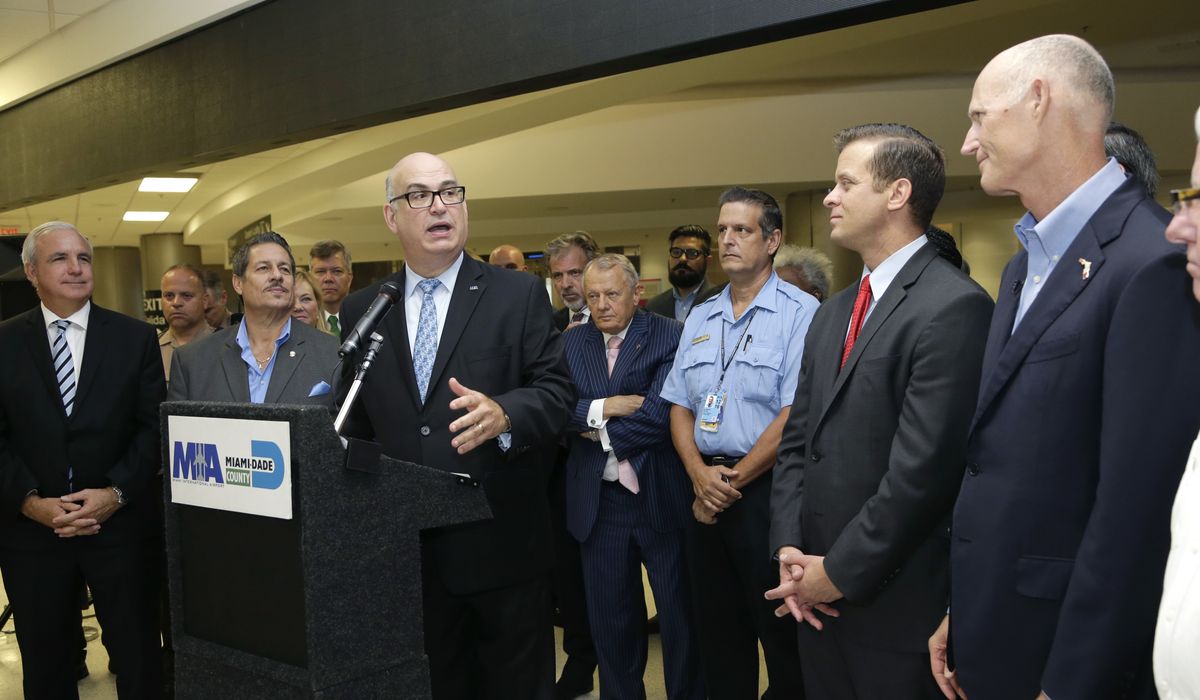


Emilio Gonzalez may seem to be an odd choice in preaching the MAGA gospel.
He worked in the George W. Bush administration running U.S. Citizenship and Immigration Services and then returned to Miami, where he served as CEO of Miami International Airport and city manager.
Mr. Gonzalez emerged as a major critic of President Biden’s immigration policy and became a founding member of Veterans for Trump, a bilingual surrogate for candidate Donald Trump. He was a transition team member for President-elect Trump and has just been named a senior fellow at the Trump-connected America First Policy Institute.
Now, Mr. Gonzalez is pursuing a bid to become mayor of Miami. He said the city needs the kind of shake-up that Mr. Trump delivered to Washington.
“MAGA in Miami is somewhat mainstream,” he said. “We’re for lower taxes. We’re for protecting our neighborhoods. We’re for border security. We’re for standing for our first responders.”
He emphasized, “It’s not what’s happening in Los Angeles.”
“Miami is an immigrant city, but the immigrant city don’t take no s—- from anybody. You have Miami as an immigrant city, but South Florida voted for Trump,” Mr. Gonzalez told The Washington Times.
Analysts say the city is ripe for MAGA magic, given the broader trends in Miami-Dade County, where Miami is the most populous municipality.
After losing the county by 19 percentage points in 2016 and 7 points in 2020, President Trump won it 55% to 44% over Vice President Kamala Harris last year. In other words, Mr. Trump went from about 334,000 votes in 2016 to 606,000 votes in 2024.
Gov. Ron DeSantis, a sometime Trump rival, went from 39% of the vote in 2018 to 55% in Miami-Dade in 2022 as Florida defied an otherwise sluggish year for the Republican Party.
Mr. Gonzalez said he has not asked for nor been offered a Trump endorsement, though David R. Custin, a political consultant in the area, said anyone seeking to run as a Republican right now would want to play up their Trump ties.
“If somebody had Trump’s endorsement, that would disproportionately help their candidacy for mayor,” he said.
Mr. Gonzalez, 68, was an early entrant into the field, which is expected to grow as Election Day nears.
He said the big issue for voters is a dysfunctional city government that seems to be in a cycle of being sued, losing and paying out million-dollar settlements.
He said quality of life is second as the city attracts wealthy visitors but is pricing out its people.
“Miami has gotten way too expensive for the people who live here,” he said.
The Cuban native came to the U.S. at age 4. He was raised in Tampa, where his family was in the tobacco business, joined the ROTC at the University of South Florida, retired as a colonel after 26 years in the Army and dabbled in a little bit of everything since.
He served on the National Security Council in the Bush administration, dipped into the private sector and then returned to become head of the relatively new USCIS.
He ran Miami International Airport from 2013 to 2017 and was Miami’s city manager from 2018 to 2020.
He said his time in Washington would help the city navigate tricky issues, such as immigration. He pledged to keep Miami from becoming a sanctuary city and said his connections in Washington would help him “make sure whatever is done within the city is done properly.”
“I will advocate for my community, I will advocate for the immigrants in my community, but I will never advocate for a murderer, a rapist, a thief or a thug,” Mr. Gonzalez said.
The Miami mayor’s office is nonpartisan, though experts say voters know the candidates’ partisan leanings.
Dario Moreno, a professor at Florida International University, said Mr. Gonzalez brings establishment credentials and experience but has an outsider vibe compared with others who are expected to enter the race.
They include the current mayor’s father, who was mayor twice in the 1980s and 1990s, and a city commissioner who served as mayor around the turn of the century.
“He’s going against some familiar names in Miami,” Mr. Moreno said. “He’s never run in an election in Miami. He has a good reputation in the business community, he’ll be able to raise a substantial amount of money. The question for me is, can he appeal to, kind of, the populist Miami base?”
That means winning over a Cuban American electorate that strongly supports Mr. Trump.
Mr. Custin said Mr. Gonzalez’s path to victory lies in letting some establishment candidates “beat each other up” and then swooping in.
“He’s not really an outsider, but he’s not an insider either,” Mr. Custis said. “I don’t blame him for deciding to run to bring some order to what has been some political chaos in the city.”
• Stephen Dinan can be reached at sdinan@washingtontimes.com.
